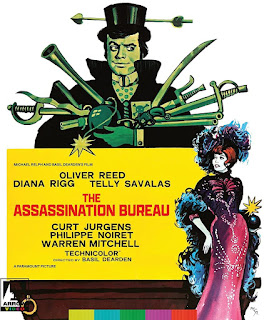The Assassination Bureau
The 1960s was a rough time for cinema. Lacking the Atomic age innovation of the ‘50s and the creative freedom of the ‘70s, it was defined by the slow decay of the studio system and evolving audiences that weren’t so easy to pin down. It wasn’t until the tail end of the decade that filmmakers found some solid footing in the form of counter-culture independents and outer-space spectacles. But the same year as Easy Rider and 2001, there were still movies like The Assassination Bureau desperately vying for attention in a world that seemed to be passing them by.
On the edge of World War 1, a clandestine organization of killers for hire is outed by a budding female journalist, Sonia Winter (Diana Rigg), who hires the chairman, Ivan Dragomiloff (Oliver Reed), to assassinate himself. Always up for a challenge, Ivan sees the contract as a chance to test the mettle of his employees…and snuff out the secret plot of his second-in-command (Telly Savalas) whose ambitions for the bureau focus on money rather than morals. In various countries, under an array of disguises, Ivan dodges his own board members in a comic game of kill-or-be-killed.
Based on an unfinished Jack London novel, The Assassination Bureau is working with one heck of a good idea. The concept of master assassins hunting down one of their own is now one of the most common conceits in action movie history (the John Wick franchise being only the most recent). But director Basil Dearden’s film is miles away from the gritty noir of Point Blank released only two years prior; his film is a flippant fantasy that mixes Mary Poppins and James Bond in equal measure…with enough camera mugging to fill several episodes of Laugh In.
Shot with the sort of flat, overlit feel of episodic television, The Assassination Bureau reeks of comedic desperation. Everything from unexpected camera zooms to goofy sound effects are employed to make the audience understand they’re supposed to be having a good time. It’s a creative choice that dates the film in much the same way as its contemporaries (think how much better Butch Cassidy & the Sundance Kid would be without those Burt Bacharach songs!) and leaves the game performances of its two leads hanging out to dry. Diana Rigg is unbearably cute and Oliver Reed proves he would have made a disarming 007 if he ever sobered up. But the film is so leaden with forced frivolity it feels more like a hostage video than the steampunk escapism it was meant to be.
Arrow’s new Blu-ray makes a good case for its historical significance, though, with a superlative audio commentary from authors Sean Hogan and Kim Newman (whose Anno Dracula series covered much of the same landscape) along with a 30-minute appreciation from critic Matthew Sweet.




Comments
Post a Comment